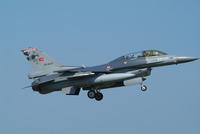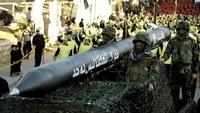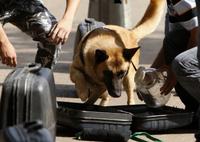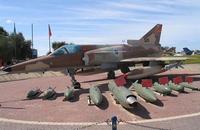-
Prosecutors ask for confidentiality in NY “Death Ray” case

Glendon Scott Crawford,a former General Electric Co. industrial mechanic, is standing trails in Albany, New York, for developed a radiological dispersal device which he tried to sell to both the KKK and to Jewish organizations so they could use it to kill Muslims. Several experts argued the device would not work since it would require massive amounts of electricity, weigh enough to crush most vehicles and would require victims to remain still in order to face prolonged exposure from close-range radiation.
-
-
Turkey shoots down Syrian military jet

Turkish fighter jets on Sunday shot down a Syrian warplane after it violated Turkey’s airspace. The Syrian military confirmed the incident, saying the plane was downed in Syrian airspace while strafing rebel positions. Syrian state TV described the incident as a “blatant aggression,” and said the pilot safely ejected from the aircraft. In 2012 Turkey changed its rules of engagement after Syria shot down a Turkish military plane, saying that any Syrian military plane approaching the Turkish border would be treated as a legitimate target.
-
-
Israel State Comptroller says some IDF units unprepared for chemical attack
Israel’s State Comptroller Joseph Shapira on Wednesday harshly criticized the Israel Defense Force (IDF) for not having sufficient number of gas masks for one of its branches. The comptroller levelled his criticism in the unclassified portion of his discussion of defense issue in his annual report on government performance. In February, Israel has discontinued the distribution of gas masks to the general population, and the dismantling of Syria chemical weapons arsenal has led some Israeli defense experts to question the need for Israel to continue and invest in defensive measures against chemical weapons attacks.
-
-
Cyber war in Ukraine – business as usual for the Russian bear
In a war — declared or otherwise — bravery and perseverance are not enough. Communications are important. Effectiveness means being able to command your troops and gather information. It also means being able to trust your communications. Disrupting and distorting communications is a dark art, the “new black” in overt and covert conflict. This is what we are seeing in Ukraine. Russia appears to be having a fine time covertly sabotaging Ukrainian networks.
-
-
Israel open to offering missile defense coverage to Jordan, Egypt
With worries about Iran military capabilities growing, a U.S. general on Monday said that Israel should consider extending the coverage area of its missile defense systems so they could cover Jordan and possibly Egypt, and an Israeli official cautiously welcomed the idea. The United States has funded most of the research and development work on Israel’s layered ballistic missile and short-range rocket defense systems, and under the Obama administration, Israel’s deployed missile interceptor systems have been integrated with U.S. global missile tracking and regional missile defense systems.
-
-
Pentagon to fund new “kill vehicle” for missile defense
The Pentagon’s fiscal 2015 budget includes $8.5 billion in funding for missile defense programs. About $300 million will be used on a new kill vehicle and it support systems. A Pentagon official said that a new kill vehicle was needed because the current system suffered from “bad engineering” and has failed several tests.
-
-
U.S. Army releases first field manual for war in the electromagnetic spectrum
Sergei Gorshkov, former Admiral of the Fleet of the Soviet Union, once remarked that “the next war will be won by the side that best exploits the electromagnetic spectrum.” The U.S. Army agrees, releasing its first field manualfor Cyber Electromagnetic Activities (CEMA). The Pentagon defines cyber electromagnetic activities as activities leveraged to seize, retain, and exploit an advantage over adversaries and enemies in both cyberspace and the electromagnetic spectrum, while simultaneously denying and degrading adversary and enemy the use of such capabilities, and protecting the mission command system.
-
-
Israel intercepts ship carrying Syrian missiles from Iran to Gaza
In its most daring – and logistically demanding –military operation in about a year, Israeli naval commandos earlier yesterday (Wednesday) intercepted an Iranian arms ship in the Red Sea, more than 900 miles from Israeli shores. The ship was carrying dozens of Syria-manufactured M-302 medium-range missiles from Iran to Islamic Jihad in the Gaza Strip. The M-302 missile would have dramatically increased the capabilities of militant organizations in Gaza. It carries a warhead of 150 kg and has a range of about 300km.
-
-
Libyan Islamists tried to ship mustard gas to Syrian rebels

Libyan officials report that they have recently apprehended several members of a Libyan Muslim extremist militia planning to ship chemical weapons to anti-Assad rebels in Syria. Colonel Mansour al-Mazini of the Libya army said that the Islamists had been caught with a container of mustard gas. The gas was confiscated by Libyan soldiers.
-
-
Black Hawks downed: Bird threat to U.S. military helicopters
Many types of aircraft are vulnerable to bird strikes, estimated to cost the aviation industry $1.2 billion worldwide per year. A new study of strikes to military rotary-wing aircraft found that there were 2,511 strikes to U.S. military aircraft. Each strike costs the military between $12,184 and $337,281. While strikes were recorded in almost all states, Florida, New Mexico, and Georgia had the highest number of incidents.
-
-
How dogs detect explosives: New training recommendations

Researchers have helped determine the science behind how canines locate explosives such as Composition C-4 (a plastic explosive used by the U.S. military). The study found the dogs react best to the actual explosive, calling into question the use of products designed to mimic the odor of C-4 for training purposes.
-
-
Hezbollah acknowledges Israel’s Monday air strike
Hezbollah, after initially denying that any of its forces were attacks Monday night, earlier today (Wednesday) admitted that Israel carried out an airstrike targeting the militia’s positions in Lebanon near the border with Syria. Hezbollah’s statement said the air strike caused damage but no casualties. A senior Israeli security official told reporters that the missiles destroyed in the attack could carry warheads heavier and more dangerous than almost all of the tens of thousands of missiles and rockets Hezbollah now has in its arsenal.
-
-
Countering counterfeit electronic components
Used and non-authentic counterfeit electronic components are widespread throughout the defense supply chain; over the past two years alone, more than one million suspect parts have been associated with known supply chain compromises. In the military, a malfunction of a single part could lead to system failures that can put soldier lives and missions at risk. A new DARPA program seeks tool that authenticates electronic components at any step of the supply chain.
-
-
Exposure to IED blasts increases risk of long-term health consequences
Blasts are the leading cause of death and injury on the battlefield, accounting for about 75 percent of all combat-related injuries in U.S. military personnel. U.S. soldiers exposed to blasts while deployed in Iraq and Afghanistan have an increased risk of developing adverse health outcomes over the long term, such as post-traumatic stress disorder (PTSD) and, in certain cases of traumatic brain injury (TBI), growth hormone deficiency, and persistent post-concussive symptoms including headaches, says a new report.
-
-
Israeli jets attack Syrian weapons convoys in Hezbollah-held area in Lebanon

For the second time this year. Israeli jets attacked targets on the border between Lebanon and Syria on Monday night as part of an ongoing campaign to prevent the transfer of advanced weapon systems from the Syrian military to Hezbollah. In 2013, the Israel Air Force (IAF) attacked military bases and arms depots inside Syria on six occasions — 30 January, 3 May, 5 May, 5 July, 18 October, and 30 October. The first attack in 2014 took place on 26 January. The previous seven air strikes were on targets inside Syria, but last Sunday attack was on Syrian military convoys just inside Lebanon, in Hezbollah-controlled areas near the Lebanon-Syria border.
-
More headlines
The long view
Tantalizing Method to Study Cyberdeterrence
Tantalus is unlike most war games because it is experimental instead of experiential — the immersive game differs by overlapping scientific rigor and quantitative assessment methods with the experimental sciences, and experimental war gaming provides insightful data for real-world cyberattacks.
Testing Cutting-Edge Counter-Drone Technology
Drones have many positive applications, bad actors can use them for nefarious purposes. Two recent field demonstrations brought government, academia, and industry together to evaluate innovative counter-unmanned aircraft systems.
European Arms Imports Nearly Double, U.S. and French Exports Rise, and Russian Exports Fall Sharply
States in Europe almost doubled their imports of major arms (+94 per cent) between 2014–18 and 2019–23. The United States increased its arms exports by 17 per cent between 2014–18 and 2019–23, while Russia’s arms exports halved. Russia was for the first time the third largest arms exporter, falling just behind France.
How Climate Change Will Affect Conflict and U.S. Military Operations
“People talk about climate change as a threat multiplier,” said Karen Sudkamp, an associate director of the Infrastructure, Immigration, and Security Operations Program within the RAND Homeland Security Research Division. “But at what point do we need to start talking about the threat multiplier actually becoming a significant threat all its own?”
The Tech Apocalypse Panic is Driven by AI Boosters, Military Tacticians, and Movies
From popular films like a War Games or The Terminator to a U.S. State Department-commissioned report on the security risk of weaponized AI, there has been a tremendous amount of hand wringing and nervousness about how so-called artificial intelligence might end up destroying the world. There is one easy way to avoid a lot of this and prevent a self-inflicted doomsday: don’t give computers the capability to launch devastating weapons.
